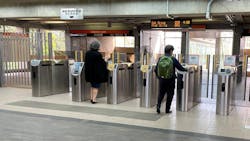Fare collection updates: Hinton Public Transit, MBTA, NJ Transit
Hinton Public Transit (HPT) in Hinton, Alberta, is making transit more accessible for youth and students while the Massachusetts Bay Transportation Authority (MBTA) is expanding access to reduced fares for income-eligible riders and New Jersey Transit (NJ Transit) is waiving fares from Aug. 26 through Sept. 2, 2024, thanks to a new transit fare holiday created by New Jersey Gov. Phil Murphy.
HPT
Beginning Sept. 1, young people aged 7 to 17 and students enrolled in public and post-secondary education will receive a special rate for travel on HPT services. Student ID is required for student passes. Children aged 6 and under will continue to ride for free and must be accompanied by an adult.
The new rates for youth and students are as follows:
- Youth cash fare: C$2 (US$0.73) per ride
- Three-month pass Youth/Student: C$50 (US$36.44) for unlimited rides
- 12-punch card Youth/Student: C$25 (US$18.22) with no expiry
The 3-month passes are for September through November, December through February, March through May and June through August.
Current rates available are:
- Cash fare: C$3 (US$2.19) per ride
- Day pass: C$8 (US$5.83)
- Monthly pass: C$70 (US$51.02) for unlimited rides
- 12-punch card: C$30 (US$21.87)
- Quarterly Seniors’ Pass: C$50 (US$36.44)
The Seniors’ Pass is for those aged 65 and older and features unlimited travel on transit for a three-month period.
HPT passes are available at various locations around the town of Hinton.
MBTA
MBTA is expanding access to reduced fares for income-eligible riders beginning Sept. 4, 2024. The launch will also include the availability of in-person support at five locations around the MBTA service area in partnership with Action for Boston Community Development (ABCD) and the Massachusetts Association for Community Action (MASSCAP) network.
The agency notes an additional 31 locations will become available for service during fall 2024. Following input from critical stakeholder groups, a pool of “early adopters” of the program will be able to apply online beginning Aug. 20, 2024.
The new program provides riders who are aged 18 to 64 and have low income with reduced one-way fares of approximately 50 percent off on all MBTA buses, subway, Commuter Rail, and paratransit (the RIDE) travel. The expansion will be the first reduced fare program to include the RIDE. As part of the change, senior users of the RIDE will also be eligible for half-priced fares on both Standard and Premium RIDE trips. Additionally, young people with low income already enrolled in the Youth Pass will be guided to enroll in the new program beginning on Sept. 4, with the Youth Pass program discontinued on Oct. 31.
“The MBTA's first-of-its-kind income-eligible reduced fare program will truly make public transportation affordable for those who need it most,” said Massachusetts Gov. Maura Healey. “For many of our low-income riders, we know the daily expense of commuting can be a burden but this program will provide the financial relief riders need and, as a result, encourage more people to take public transportation. We are thankful to the legislature for their partnership in securing the funds in our FY 25 budget that make this program possible.”
“Implementing low-income fares across the entire MBTA system is an important step toward our administration's goal of making Massachusetts more equitable, more affordable and more competitive,” said Massachusetts Lt. Gov. Kim Driscoll. “This program will have a direct impact on the lives of so many commuters across the MBTA system and we’re grateful for the leadership of General Manager [Phillip] Eng, Secretary [Monica] Tibbits-Nutt and the legislature for getting this done.”
Riders with low income will be able to apply in multiple languages online and at five in-person locations provided by ABCD and MASSCAP around the MBTA service area. Program participants can demonstrate eligibility via existing enrollment in programs with a cutoff of 200 percent of the federal poverty level (or lower), including Supplemental Nutrition Assistance Program, Transitional Assistance for Families and Dependent Children, Emergency Aid to the Elderly, Disabled & Children, MassHealth CarePlus, MassHealth Family Assistance, MassHealth Limited, MassHealth Standard and MASSGrant.
“ABCD is excited to be a partner in the Income Eligible-Fare Program with the MBTA, making transportation more accessible for those who need it the most,” said ABCD President and CEO Sharon Scott-Chandler. “This is the type of public and private collaboration that represents how equity is created for those who find themselves struggling in the economic environment where the cost of living is at an all-time high.”
“The Income-Eligible Reduced Fare program resonates with the anti-poverty mission of Community Action and meets a fundamental need of vulnerable people living with low incomes; its implementation will go miles in terms of supporting increased access to job training and employment,” said MASSCAP Executive Director Joe Diamond. “Along with ABCD as the lead agency, Community Action Agencies in the MBTA service area very much appreciate the partnership with the MBTA and are looking forward to connecting the people we serve with reduced fare cards via a streamlined and innovative approach to conferred eligibility.”
According to the agency, prior research shows riders with low income are expected to take 30 percent more trips with a reduced fare, significantly increasing mobility while saving on transportation costs. More than 60,000 riders are expected to qualify for and enroll in the program, which is expected to result in up to 8 million more trips per year.
“Connectivity is essential not only for the quality of life of individuals and their families, but for our collective long-term well-being,” said Massachusetts Department of Transportation Secretary and CEO Monica Tibbits-Nutt. “When we make the MBTA more accessible for low-income riders, we are helping to make our transportation system more equitable – and our communities healthier, stronger and more prosperous. I applaud General Manager {Phillip] Eng and his team for their commitment to uplifting our communities who rely on our public transit.”
The initiative is thanks to the collaboration of multiple partners across the Commonwealth with the MBTA, including the Commonwealth’s Executive Office of Health and Human Services (EOHHS) in allowing riders to demonstrate eligibility through existing EOHHS programs, the Registry of Motor Vehicles (RMV) in allowing riders to offer proof of identity through an RMV ID, ABCD and the MASSCAP Network in providing in-person support and Omicron Technology Solutions in providing additional application reviews.
“This is a critical step in making transit more affordable for those that need it the most. I thank Secretary Tibbits-Nutt for her advocacy of this initiative, the governor and the legislature for their foresight to include funds in our FY24 and FY25 budgets to enable us to develop this program, our numerous partners at the EOHHS, the RMV, ABCD, MASSCAP and Omicron Technology Solutions who were instrumental in helping us launch this program and the many advocates who have for years championed this initiative, which will benefit so many across all modes,” said MBTA General Manager and CEO Phillip Eng. “This is a meaningful step that allows all of the public that rely on mass transportation to use it, improving quality of life, boosting economic mobility, and connecting people and communities.”
NJ Transit
New Jersey Gov. Murphy has launched a transit fare holiday for all customers. As part of the holiday, from Aug. 26 through Sept. 2, 2024, fares will be waived for all modes of transportation, offering free rides across the NJ Transit network.
Monthly pass holders who have already purchased an August pass, which covers travel through the end of the month, will automatically receive a 25 percent discount on their September monthly pass purchase through the mobile app, at Ticket Vending Machines (TVMs) or ticket windows.
According to Gov. Murphy, the fare holiday is a way to express the sincere appreciation for customers’ continued loyalty and patronage, particularly during a time when transit service has not consistently met riders’ expectations or the state’s expectations.
Many of the recent service disruptions have occurred on Amtrak’s Northeast Corridor (NEC). NJ Transit has been working tirelessly advancing the joint plan with Amtrak announced immediately following Gov. Murphy’s meeting with NJ Transit and Amtrak leadership on June 27, 2024, to improve service on the busiest corridor in the country. While the root causes of these incidents have not yet been identified, significant short-term actions have already been taken and there has been noteworthy progress.
NJ Transit personnel have increased equipment inspections on platforms while Amtrak has stepped up its efforts in inspecting and repairing their catenary (overhead wire), track signal systems and substations along the NEC. The collaborative efforts have already led to a noticeable decrease in infrastructure-related incidents.
“Understanding that our commuters have faced many disruptions this summer, we are providing a one-week fare holiday for NJ Transit riders,” said Gov. Murphy. “As we work diligently with Amtrak to investigate and address the issues that have occurred this summer, especially on the Northeast Corridor, we hope this fare holiday offers our commuters some relief. We also encourage New Jerseyans to take advantage of this opportunity and we continue to be thankful to the many New Jerseyans who depend on public transit.”
Additional longer-term actions to address state-of-good-repair of Amtrak infrastructure include adding resources to increase testing of transformers in substations and evaluating opportunities to expand work windows with service adjustments to accelerate repairs and upgrades. In addition, NJ Transit is working with Amtrak to support overall capital renewal by pursuing additional grants to expedite the replacement of catenary, substations, and transmission and signal lines through the Fed-State Partnership Grant Program.
NJ Transit also recognizes the River LINE light-rail service has not been meeting its performance standards during the past several weeks and has implemented a supplemental bus plan as an interim measure to improve service reliability and predictability for customers traveling on weekdays. The agency says it is holding its contracted operator accountable to expedite necessary repairs and upgrades to the light-rail vehicles to restore reliable weekday light-rail service as quickly as possible.
About the Author
Brandon Lewis
Associate Editor
Brandon Lewis is a recent graduate of Kent State University with a bachelor’s degree in journalism. Lewis is a former freelance editorial assistant at Vehicle Service Pros in Endeavor Business Media’s Vehicle Repair Group. Lewis brings his knowledge of web managing, copyediting and SEO practices to Mass Transit magazine as an associate editor. He is also a co-host of the Infrastructure Technology Podcast.

